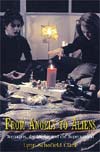General Introductions
Non-Sectarian Introductions | Non-Sectarian Books | The Angel Craze | Clark, From Angels to Aliens
Non-Sectarian Introductions
Wikipedia: Angel. This is a good introduction to angels in various religious traditions. If you don't know, Wikipedia is an "open-source" encyclopedia. Anyone can edit it, anytime. Surprisingly, this works. Occasionally inaccuracies and individual bias creep in.
The Straigth Dope. This is a lengthy, mostly high-quality survey of angelology by a staff-writer at the Straight Dope, an amazingly varied repository of information. See also How can you tell a good coconut from a yukky one? .
"You Say Malachim, I Say Apsaras: Angels, by any name, exist in many world religions" by Rebecca Phillips. Popular, simplifying and syncreticistic summary of world beliefs.
alt.religion.angels on GoogleGroups. Runs the gammut.
Non-Sectarian Books
 Amazon. Angels by James Underhill.
Amazon. Angels by James Underhill.
Since nobody on the well will stick up for this book, I will. It's a great book, tumbling over with great art, done large and in color. Although there's some history and theology, it's basically an art book, and although it's not a work of original or deep scholarship, it gives you an entertaining college-lecture slide tour of angels in Western art. What's not to like about that?
The Angel Craze
"New angles on angels" from the "Resources for Reporters" section of the Religion Newswriters Association website (July 2004). Short article argues that angels are an increasingly hot religious and cultural topic—"embraced by a widening spectrum of traditional and nontraditional religious beliefs." It also lists authorities for reporters to call, by religious tradition and region, and a nice short set of internet links.
"Hell is back in business" by Steve Burgess, Salon (June 2000).
"The angel craze seems to have petered out and the moment could be right to address a neglected spiritual need: our deep-seated longing for hell."
Clark, From Angels to Aliens
Although not focused on angels per se, Clark's book attempts to explain the significance and cause of the contemporary explosion in New Age religious expression among teenagers. This is also a good "internet topic," because the reviews come at from so many different viewpoints.
 Amazon. From Angels to Aliens: Teenagers, the Media, and the Supernatural by Lynn Schofield Clark. (Publisher, Oxford UP blurb)
Amazon. From Angels to Aliens: Teenagers, the Media, and the Supernatural by Lynn Schofield Clark. (Publisher, Oxford UP blurb)
![]() Public Radio Show
Speaking of Faith: "A Return to the Mystery: Religion, Fantasy, and Entertainment" with Clark and Phyllis Tickle.
Public Radio Show
Speaking of Faith: "A Return to the Mystery: Religion, Fantasy, and Entertainment" with Clark and Phyllis Tickle.
Interview with Clark, "Are Evangelicals Fueling Teen Fascination with the Powers of Darkness?" Christianity Today Magazine (July 7). Clark is interviewed by Agnieszka Tennant. Great read.
"Angel invasion" a review by Melissa Wiginton, Christian Century (October 2003).
"While adolescents' interest in supernatural phenomena long predates Buffy, Clark correlates the increasing number and intensity of supernatural stories in television and the movies with the rise of evangelicalism in the political arena. Evangelicals brought good and evil—as they defined them—to the fore in public discourse and, in doing so, heightened public imagination about those categories. Media producers seized this opening and began crafting their own stories of good and evil, with angels, aliens and supernatural entities as characters. Clark names this the 'dark side of evangelicalism.'"
"Teens, Media, and Metaphysic Universe" short review by "gothic_earthshaman" (a teenage Wiccan, this is what's great about the internet). Unfortunately, the review doesn't have much analytical meat. This is a shame, as it was the only Wiccan take on Clark's book I could find.
"The Disenchanters" by Agnieszka Tennant, joint review of Clark and of Bill Ellis' Lucifer Ascending: The Occult in Folklore and Popular Culture, from Christianity Today (January-February 2004). Review attacks the notion that "magic-phobic right-wingers" have unintentionally caused the upsurge. The final paragraph unintentionally confirms Clark's diagnosis:
"One only wishes to turn the tables on Ellis and Clark: that they, too, would see the strange experiences they purport to explain not just through the lens of the detached wisdom of their expertise, but also through the wide-open, believing eyes of those who report them—at least considering the possibility that these stories point to something more potent than myth, legend, social rite of passage, venting, or subversion."
![]() Reviewed by Hillary Warren,
Journal of Communication (June 2004).
Reviewed by Hillary Warren,
Journal of Communication (June 2004).
"The topic provides rich opportunities for surprise and humor, such as with the Wiccan family in which the parents are concerned about their teens' straying from Wiccan "orthodoxy."
Talk Clark gave in Denver profiled by the Presbyterian Church News.
![]() "Popular Culture: Replacing Religion for Today's Teens?" by Lynn Shoefield Clark, from
The Bible in Transmission (1999). Article written during her research, but before she published the book. I find this paragraph accurate:
"Popular Culture: Replacing Religion for Today's Teens?" by Lynn Shoefield Clark, from
The Bible in Transmission (1999). Article written during her research, but before she published the book. I find this paragraph accurate:
"To put it simply, teens just don't seem to be very interested in learning about ultimate truths from authoritative sources like the Bible or religious traditions. … They take for granted a certain cynicism toward institutions, just as their parents, children of the 1960s, did before them. They also have a cynicism toward history: their educational experiences have taught them of the many histories that have remained untold, from those of the poor to those enslaved or otherwise oppressed."[1]
Notes:
- The point about history is interesting and, since I just left a K-6 publishing job I feel obligated to extend it. Textbooks for school kids today are increasingly fond of the rhetoric of "untold stories," largely connected with the history of oppressed groups. (There's much to this idea; the rhetoric is the point here.) They are taught that previous histories (ie., what their parents learned) were incomplete, and had stifled these voices. By contrast, their textbooks imply they have been granted access to these voices, which are more valuable for having being suppressed. Of course, kids today feel the same way about their textbooks as they always have—detest Mansa Musa as much as they ever did Henry VIII. But it's easier to rebel against content than against the rhetoric, intellectual habits and ideals that underlie it. There is, anyway, in the rhetoric of Wicca and other New Age beliefs a powerful current of "suppressed voices." Far from rejecting history, "spiritual" teens today look for and expect alternate, suppressed histories: ancient communities of European witches preserving sacred rites for millenia, ancient traditions of female spiritually quashed by patriarchal institutions, ancient astrological beliefs only now coming to light, etc. In point of fact, these New Age beliefs are always modern recreations of ancient beliefs—as a scholar of Greek astrological texts, I can tell you they bear little resemblance to modern psychological astrology—but this shimmer of continuity (or, with Clark, "possible" continuity) is an important support. (back)

If you enjoy this site you may like these other sites by me:
Cleopatra on the Web. Everything about Cleopatra VII of Egypt, in history ad the Western imagination.